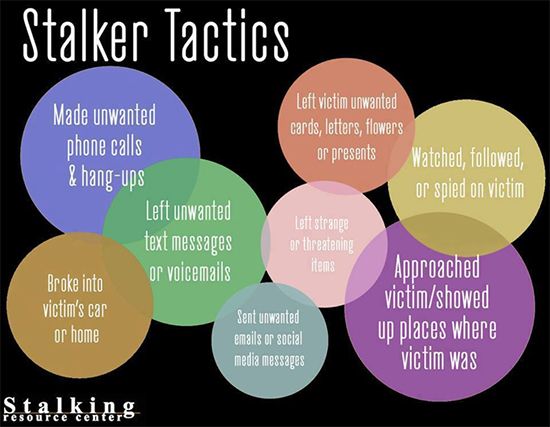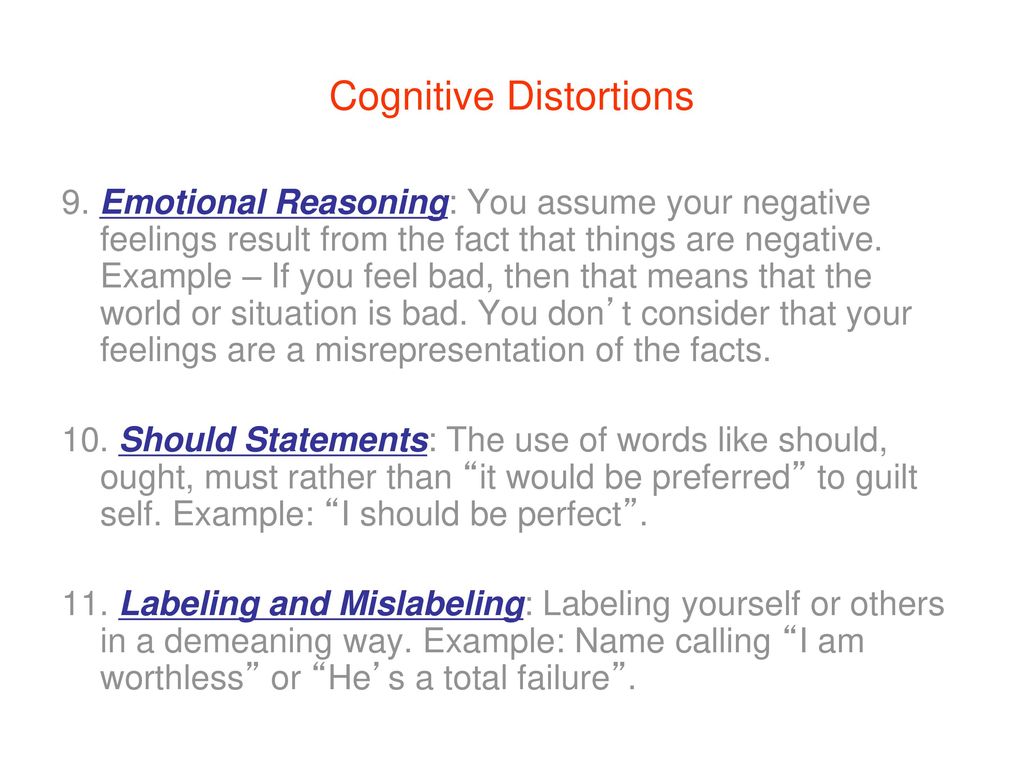Stalking warning signs
Stalking - Victim Connect Resource Center
Stalking
Stalking is a course of conduct directed at a specific person that would cause a reasonable person to feel fear. Unlike other crimes that involve a single incident, stalking is a pattern of behavior. It is often made up of individual acts that could, by themselves, seem harmless or noncriminal, but when taken in the context of a stalking situation, could constitute criminal acts. Legal definitions of stalking differ depending on where you live; however stalking is a crime under the laws of all 50 states, the District of Columbia, the U.S. Territories, and the Federal government. Stalking is serious, often violent, and can escalate over time.
What is Stalking?While this list isn’t exhaustive, you may be a victim of stalking if someone:
- Repeatedly calls your phone, including hang-ups
- Follows you and shows up wherever you are
- Sends unwanted gifts, letters, texts, or emails
- Damages your home, car, or other property
- Monitors your phone calls or computer use, possibly through spyware
- Uses technology, like hidden cameras or global positioning systems (GPS), to track where you go
- Drives by or lingers near your home, school, or work
- Threatens to hurt you, your family, friends, or pets
- Performs other actions that control, track, or frighten you
- Uses other people to try to communicate with you, like children, family, or friends
If you have been stalked, you may:
- Be fearful of what the stalker is capable of doing
- Feel vulnerable, unsafe, or not know who to trust
- Feel depressed, hopeless, angry, anxious, irritable, on-edge, and hypervigilant
- Have flashbacks, disturbing thoughts, feelings, or memories
- Feel confused, frustrated, or isolated because other people don’t understand why you are afraid
- Miss work or school for fear of seeing your stalker
- Change your normal or preferred social media habits
While there is no universal set of steps that will work for everyone, these actions may help you feel in control of your life again:
- Call 911 for Immediate Assistance – You know yourself and your situation better than anyone.
Trust your instincts and call for help if you feel you are in danger.
- Alert Others – Tell trusted friends, family, neighbors, coworkers, and/or your HR department to keep an eye out for suspicious activity and so they don’t mistakenly give out information to someone pretending to be a loved one.
- Connect with an Advocate – Advocates can often be found at local domestic violence and/or sexual assault agencies, police departments, and district attorney’s offices. Advocates can help explain local stalking laws, walk you through filing a protective order, connect you with local services, and help you develop a safety plan.
- Document Every Incident – Make a log of encounters with the stalker, hang-up calls, and public sightings. Save all messages, emails, and your call history. Consider using this incident and behavior log form from the Stalking Prevention, Awareness, & Resource Center (SPARC).
- End All Contact – Sometimes this is easier said than done, but try not to answer calls or messages, even if you are requesting that the stalker stop.
 Any contact may encourage the stalker to continue the stalking behavior.
Any contact may encourage the stalker to continue the stalking behavior. - Take Threats Seriously –A direct threat against you is an obvious sign of danger. A stalker can also use threats of suicide or self-harm to manipulate you into staying in contact or a dangerous situation.
- Create a Safety Plan – Develop a personalized plan to keep yourself safe. Find help doing this here or connect with an advocate for assistance.
- Prepare Your Children – Teach your children what to do if there is an emergency, like where to hide if there is danger in the house, or how to call the police or a trusted person for help.
The Stalking Prevention, Awareness, and Resource Center (SPARC) offers a variety of information related to stalking, including information on stalking, safety planning, and other resources.
Technology Safety & Privacy: A Toolkit for Survivors from the National Network to End Domestic Violence contains safety tips, information, and privacy strategies for survivors when using technology.
Visit our VictimConnect Resource Map for additional resources or contact the VictimConnect Resource Center by phone or text at 1-855-4-VICTIM or by chat for more information or assistance in locating services that can help you or a loved one after experiencing stalking.
5 Early Warning Signs of Typical Stalkers' Behaviour
Feeling watched, harassed or constantly under threat from someone is an awful experience, and it can be difficult to know what to do. For many of us, stalkers are the stuff of TV dramas or celebrity horror stories. We struggle to imagine that anyone would fixate on us in such an extreme way because we know ourselves to be ordinary. Because people find the idea of being stalked ridiculous, it’s easy to brush off suspicions as paranoia. The reality is that stalking is much more common than we think, and can last for years. The average stalking case lasts 15 months, and most people know their stalker. According to the Suzy Lamplugh Trust’s report, Out of Sight, Out of Mind (2018), 45% of all stalkers are ex-partners. By knowing the red flags to watch out for, you can stop controlling behaviour before it develops into long term stalking.
According to the Suzy Lamplugh Trust’s report, Out of Sight, Out of Mind (2018), 45% of all stalkers are ex-partners. By knowing the red flags to watch out for, you can stop controlling behaviour before it develops into long term stalking.
Stalkers are predators who fixate on a particular person, spending disproportionate time and energy on finding opportunities to interact with them. They might hang around in places they know you will be, try to contact you via details you never gave them, or check up on your social media posts. On their own, these actions can be seen as reasonable, and stalkers often convince themselves and others that they are just worried about you and following you for your protection. Because the law in the UK offers no legal definition of stalking, getting stalkers to stop their behaviour is difficult.
In this article, we discuss the warning signs of stalking and some ways you can protect yourself. If you are in immediate danger, you should call 999 right away.
The most concise definition of stalking comes from the Suzy Lamplugh Trust. Here, stalking is defined as ‘a pattern of fixated and obsessive behaviour which is repeated, persistent, intrusive and causes fear of violence or engenders alarm and distress in the victim’. Anyone could become a stalker if they were to become fixated on another person and take steps to force interaction against that person’s will. Anyone could be a victim of stalking, regardless of gender, age, ethnicity and sexuality.
Is Stalking a Crime?The law around stalking depends on where you live in the UK. In England and Wales, the Protection of Freedoms Act 2012 identifies stalking as a criminal offence for the first time. In Scotland, stalking is an offence under section 39 of the Criminal Justice and Licensing Act 2010. Throughout Northern Ireland, stalking is dealt with by the PSNI under the Protection from Harassment Order 1997, but there is no specific anti-stalking law.
None of the UK nations has a law giving a legal definition of stalking. This is because stalkers are unpredictable, using varied methods and degrees of severity. The PFA 2012 criminalises ‘harassment which involves a course of conduct that amounts to stalking’, saying that this ‘can be committed in two ways, namely
- Stalking involving fear of violence
- Stalking involving serious alarm or distress.’
This means that evidence of stalking rests on the victim proving that they have been seriously distressed by the stalker’s behaviour, rather than the behaviour itself.
What are Stalkers?A more detailed identification comes from the Protection from Harassment Act 1997, which lists behaviours as associated with stalking. Stalkers might:
- Follow a person
- Contact, or attempt to contact, a person by any means
- Monitor a person’s use of the internet, email or any other form of electronic communication
- Leave unwanted gifts or notes
- Publish material relating to the victim
- Loiter in any place (public or private)
- Interfere with any property in the possession of a person
- Watch or spy on a person
The offence created by the PFA 2012 does not look at specific and isolated incidents, but instead focuses on the cumulative effect stalking has on the victim. The common behaviours of stalkers listed above need to be repeated and cause distress to be considered as stalking. Under current legislation, the pattern of behaviour must have a substantial adverse effect on the victim’s usual activities for charges to be brought. You may be able to prosecute for stalking if a repeated pattern of the above behaviours means you have had to:
The common behaviours of stalkers listed above need to be repeated and cause distress to be considered as stalking. Under current legislation, the pattern of behaviour must have a substantial adverse effect on the victim’s usual activities for charges to be brought. You may be able to prosecute for stalking if a repeated pattern of the above behaviours means you have had to:
- Change your route to work, work patterns or employment
- Arrange for someone else to pick your children up from school
- Put additional security measures in place at home
- Change the way you socialise or stop altogether
If you know the signs to watch you for, you may be able to catch harmful behaviours before they develop into stalking. Particularly if the person is trying to start a relationship with you, these behaviours are often laughed off as cute, protective or signs of attachment. However, to dismiss a pattern of behaviour that makes you uncomfortable is naive and unnecessary. If something is making you uncomfortable, say so.
If something is making you uncomfortable, say so.
The following behaviours are not an exhaustive list, but they are usually the early activities for stalkers to try during a campaign of harassment.
1. Contacting you constantlyCalling you multiple times a day, texting repeatedly before you respond, or commenting on lots of your social media posts should be a warning sign. If it seems like they need your attention at all times, they aren’t caring about you. Likewise, if they are continually asking where you are or who you’re with, they aren’t respecting your privacy.
2. Getting your details before you give themIt’s normal for someone to follow you on Facebook after you meet them, and asking a friend for your number is often considered ok. However, if they won’t tell you how they got your details, or show up at your home before you’ve told them your address, alarm bells should be ringing. This is not dedication or resourcefulness, but an invasion of privacy and you have every right to tell them it made you uncomfortable.
While most of us share our days out on social media, we don’t expect to be quizzed by someone new about a photo with a friend. As with repeatedly asking your whereabouts, asking for too many details about what you’ve done in the past can be a sign of extreme control. This is a strong red flag, especially if they respond with judgemental or derogatory comments. Seek help from someone you trust.
4. Showing up UnannouncedYou have the right to a personal life. If someone repeatedly turns up unannounced to your plans, they may be trying to feature in all of your social interactions so that they can control you. Stalkers are even known to orchestrate events in which you need help. For example, they might steal your keys only to give them to you, saying they found them. This helps them feel like a hero, despite presenting a danger to you. If their efforts are unsuccessful for a long time, but they are not reported for an offence, stalkers might go to such lengths as filing petty lawsuits, just to manipulate you into interacting with them.
Gifts for no reason are another early warning sign, especially if you’ve expressed no romantic interest. One typical way stalkers manipulate you into accepting a gift is to send it to your workplace, causing you embarrassment and distress. If their affections are not returned, this can escalate into inappropriate and even pornographic presents.
If you notice any of these signs, you should tell the perpetrator that you do not accept their behaviour. Tell them that if they continue, you will report them for harassment.
How can I Stop a Stalker?How can a Private Investigator help?The Out of Sight, Out of Mind report found that, in 2017, UK police forces recorded 8,364 stalking cases. Unfortunately, this record high still represents less than 1% of the cases that are estimated to take place each year. This disparity is likely due to people not feeling they can report stalking incidents to the police, as in most cases a victim will know their stalker already. Victims may feel that their concerns are not worth police time, or that they won’t be listened to.
Victims may feel that their concerns are not worth police time, or that they won’t be listened to.
Unless people make reports, the police cannot do anything about stalkers, so reporting the behaviour is necessary to receive adequate police assistance. The more people report stalkers, the more police become aware of the issue.
If you feel you are being stalked, but aren’t yet ready to go to the police, a private investigator might be able to help. Private investigators are professionals who work for you, so they won’t push you to the bottom of a paperwork pile, or fob you off with a helpline. At Reveal PI, our investigators are trained in surveillance and bug sweeping. We may be able to help you gather evidence of the behaviour by discreetly monitoring places your stalker is likely to linger. Using photography and videography, we may be able to display the behaviour which is causing you distress, to help you understand the extent of the behaviour. All our evidence is time and date-stamped, and fully admissible in court.
Ever considered hiring a private investigator in the UK? Call Reveal PI Today at 0330 808 9344 or visit 11 St Paul’s Square, Birmingham, West Midlands B3 1RB.
"Best answer: no answer"
Chapter on stalking from Gavin de Becker's book The Gift of Fear. How to recognize danger and respond appropriately to it. Becker explains why we often confuse stalking with courtship and explains how to get rid of a stalker.
∗∗∗
"I tried to cool him off." With these words begins a story that is heard in my office several times a month. Before meeting me, an educated young woman might have told the same story to her friends, to a psychologist, to a private detective, to a lawyer, to a police officer, perhaps even to a judge, but the problem hasn't gone away. This is a story about a situation that at first seemed innocent, or at least controlled, but now seems frightening. This is a story about a man who at first behaved like an ordinary fan, but soon revealed himself in a different capacity.
We distinguish between two broad categories of stalking: harassment by a stranger and harassment by a person known to the victim. Cases where a complete stranger fixates on an ordinary citizen are very rare compared to other types of stalking and almost never lead to manifestations of violence. Therefore, I will be looking at cases that affect a huge number of victims: stalking by someone who has romantic aspirations, very often by someone who the woman knows, whom she has dated.
While the media loves to portray stalkers as a unique type of criminal, those who target ordinary citizens are not all that unusual themselves.
These are not aliens from Mars, but residents of Miami and Boston, San Diego and Brentwood. This is the guy your sister dated, the man your company hired, the young man your friend married.
To better understand the issue, we men must see them as "one of us." Speaking all over the country, I sometimes ask the audience the question: “How many men here have found out where a girl lives or works without asking her directly? How many men drove by a girl's house to see what cars were there, or called to hear who would come, and then hung up?
From the forest of uplifted hands, I realized that a lot of people allow this kind of behavior. After one such lecture, a policeman who was in the audience approached me and asked to be allowed to speak to me face to face. He told me that only now he realized how persistently he pursued a cadet of the police academy, where he worked at that time. She turned him down for eighteen months, all the while worrying that the rejection would affect her career. “She didn't show that she wanted to start a relationship with me, but I didn't give up, not for one second,” he said, “and it paid off. We got married".
After one such lecture, a policeman who was in the audience approached me and asked to be allowed to speak to me face to face. He told me that only now he realized how persistently he pursued a cadet of the police academy, where he worked at that time. She turned him down for eighteen months, all the while worrying that the rejection would affect her career. “She didn't show that she wanted to start a relationship with me, but I didn't give up, not for one second,” he said, “and it paid off. We got married".
Let's say it paid off. But this story tells us just how complex the problem of romantic persecution is. Obviously, in recent decades, the stakes in resisting "romantic encroachments" have increased many times - for women. There is an invisible line between "tolerable" and "too much," and men and women don't always agree on where the line is. The persecutors and their victims never agree on this issue, but sometimes the police and the victims also understand it differently.
Everyone agrees on this when it comes to violence, but why can't we reach a consensus before we go so far? To answer this question, I have to recall Dustin Hoffman's character breaking into a church and Demi Moore's character showing up uninvited to a business meeting.
Next, I will talk about ordinary people, and we need to discuss the terminology in advance. It may not seem like it has anything to do with stalking and stalking, but I'm sure your intuition has already told you that it isn't.
In the 1960s, a film was released that told in pleasant language about how a young man can court a woman. This movie is called The Graduate. Dustin Hoffman's character dates a girl (played by Katherine Ross) and asks her to marry him. She says no, but he doesn't hear her. He waits for her after school at the school and asks again and again. In the end, she writes him a letter, in which she says that she thought it over well and decided not to marry him. In reality, she leaves town and marries someone else. This might seem like a clear enough hint, but not in the movies.
This might seem like a clear enough hint, but not in the movies.
Hoffman uses stalking to find her. He pretends to be a friend of the groom, then a family member, then a priest. He eventually finds the church and breaks into it just seconds after announcing Katherine Ross as another man's wife. Afterwards, he beats the bride's father, hits several more people, and brandishes a large wooden cross to fend off guests who try to help the family.
And what is the result? He gets the girl. She elopes with Dustin Hoffman, leaving her family and new husband behind. At the same time, with her act, she tramples on the principles: a) you need to listen to what a woman says; b) no means no; c) a woman has the right to decide who to let into her life.
People of my generation saw in The Graduate that over all romantic strategies one prevails: pushiness. The same strategy is the main one in all matters related to stalking. Men seeking relationships with women who don't want it and eventually winning is a commonplace in our culture. Suffice it to recall the films Flashdance, Tootsie, The Heartbreak Kid, 10, Blame It on Rio, Honeymoon in Las Vegas” (Honeymoon in Vegas), “Indecent Proposal” (Indecent Proposal).
Suffice it to recall the films Flashdance, Tootsie, The Heartbreak Kid, 10, Blame It on Rio, Honeymoon in Las Vegas” (Honeymoon in Vegas), “Indecent Proposal” (Indecent Proposal).
This Hollywood formula could be called "Boy wants girl, girl doesn't want boy, boy harasses girl, boy gets girl." A lot of movies teach us that if you don't back down, even if you hurt her, even if she says she doesn't want to do business with you, even if you treat her like a bitch (and sometimes because you treat her like a cattle), then you will get this girl. Even if she's in a relationship with another man, even if you don't look like Dustin Hoffman, you'll end up with Katherine Ross or Jessica Lange in the end. Annoyance will win the war No matter what (another film on the same topic, by the way). Even the outwardly innocuous TV show Cheers touches on this theme. Sam's intrusive and obscene sexual harassment of two female co-workers for eight years did not result in his dismissal or prosecution. On the contrary, he had connections with both women.
On the contrary, he had connections with both women.
∗∗∗
Real cases of stalking can teach young women a useful lesson: importunity only indicates importunity, not love. The fact that a romantic stalker is relentless does not mean that you are special to him, but that the young man is not all right.
The fact that men and women often speak different languages is not new. But when the stakes are high, it is important to remember that men are expected to be gentle in harassing women, and women are expected to be gentle when they reject men.
Naturally, this stereotype leads to misunderstandings, and it's time for us to talk about the popular practice of "let it cool down."
Having learned their lesson, women often say less than they mean to a man they don't like, and men, having learned their lesson, often hear even less than what is said. Nowhere is this problem expressed more strongly and troublingly than in the words of thousands of fathers (and mothers), older brothers (and sisters), in films and television shows that teach men that when she says no, she doesn’t have it. in mind.
in mind.
Add to this the fact that women are taught to act hardy, even when it doesn't suit their feelings. As a result, the answer "no" in this culture can mean a lot. Here are some examples: maybe not sure, I found my man, not yet, give me time, keep trying.
There is one book in which the meaning of the word "no" is always clearly explained. This book is a dictionary, and if Hollywood writers don't seem to use this book very often, then we should. We must teach young people that "No" is a complete sentence.
This is not as simple as it might seem, given the deep-rooted no/maybe hybrid in our culture. It became part of the contract between men and women, and was studied even by the social contract theorists Rousseau and Locke. Rousseau wondered: "Why do we take into account their words when it is not the mouth that speaks for them at all?" Locke spoke of the bewitching "silent assent" that a man reads in a woman's eyes "despite the refusal of the mouth." Locke even said that a man defends a woman's honor when he ignores her refusal: "If he then achieves his happiness, then he is not rude, he is decent. " In Locke's world, date rape isn't a crime at all—it's a sign of respect.
" In Locke's world, date rape isn't a crime at all—it's a sign of respect.
Even if men and women in America spoke the same language, they still live by very different standards. For example, if in a film a man studies a woman's daily routine, finds out where she lives and works, even comes to her work without warning, then this demonstrates his determination, serves as proof of his love. When Robert Redford does this to Demi Moore in Indecent Proposal, it's amazing. But if she comes to work for him without warning, and interrupts a business lunch, then this is alarming.
If in the film a man wants to have sexual contact or is pushy, then he is a normal guy, but if a woman does the same, then she is either a maniac or a killer. Think of Fatal Attraction, The King of Comedy, Single White Female, Play Misty for Me, Hand, rocking the cradle” (The Hand That Rocks the Cradle) and “Basic Instinct” (Basic Instinct). When men harass women, they usually get them. When women are pursued, they (or they) are usually killed.
Popular films can be a reflection of society or constructors of society, depending on who you ask the question to, but either way they model our behavior. In the early stages of stalking scenes in movies—and all too often in life—the woman watches and waits, adjusting to the expectations of the interested man. She is not heard or understood, she is a screen onto which a man projects his needs and ideas of what this woman should be like.
For some men, stalking is a way to raise the stakes when women don't play along. It is a crime of power, control, and intimidation, much like date rape. In fact, many cases of stalking can be called delayed rapes - they take away freedom, they raise the passion of a man and ignore the desires of a woman. It doesn't matter who exactly the stalker is - a forced to live separately husband, ex-boyfriend or unwanted boyfriend. He embodies the most brutal rule in our culture, depriving women of the right to decide with whom they live. It quickly becomes clear that we have something worse than just a double standard - we have a dangerous standard.
I have successfully lobbied for stalking laws in several states. But I would give them all for the fact that in high school young people were taught to hear and understand what “no” is, and girls were taught that it is normal to say no. It would be a good idea to include safe escape strategies in the curriculum.
Of course, there is no need to say that it is not necessary to call the object "Let's cool its ardor." If the culture taught women to say “no” to men and allowed them to do so, or if more women were given the opportunity to do so early in a relationship, then the incidence of stalking would decrease significantly.
∗∗∗
Finding Prince Charming took on more importance than getting rid of the Bad Boy, so women weren't taught how to end relationships. In our school course, it is imperative to talk about the rule that applies to all cases of intrusive persecution: do not get involved in negotiations. If a woman has made a decision that she does not want to have a relationship with a particular man, this should be said once, but unambiguously. Almost every contact after a rejection will be treated as a negotiation. If a woman tells a man over and over again that she doesn't want to talk to him, she still says it, and every time she does, she betrays her decision. If you tell someone ten times that you don't want to talk to him, you are talking to him nine times more than you wanted to.
Almost every contact after a rejection will be treated as a negotiation. If a woman tells a man over and over again that she doesn't want to talk to him, she still says it, and every time she does, she betrays her decision. If you tell someone ten times that you don't want to talk to him, you are talking to him nine times more than you wanted to.
When a woman gets thirty messages from a stalker and doesn't call back, and then gives up and still calls him, no matter what she says, he realizes that the cost of talking to her is thirty messages on the answering machine. For a man of this type, any contact is considered a success. Of course, some victims are afraid that if they don't answer, they will provoke the stalker, so they try to calm him down. As a result, the man believes that the woman is contradictory, not self-confident, but really loves him, although she does not yet know about it.
When a woman refuses someone who has a crush on her and says, "I just don't want to start a relationship right now," all he hears is "right now. " For him, this means that she will want to start a relationship later. The refusal should sound like this: "I do not want to start a relationship with you." Until it is said clearly, and sometimes even after that, he hears nothing.
" For him, this means that she will want to start a relationship later. The refusal should sound like this: "I do not want to start a relationship with you." Until it is said clearly, and sometimes even after that, he hears nothing.
If she says: “You are a cool guy and you are not boring, but you need another one, and now my head is just not in the right place,” then he thinks: “She really likes me, that's why she was so embarrassed. I have to prove to her that I need her.”
When a woman explains why she refuses, such a man will take any given reason as a challenge. I suggest that women never explain why they do not want to enter into a relationship, but state directly that this is their decision and they hope that a man will respect him.
Why should a woman explain the intimate aspects of her life, plans and romantic preferences to someone with whom she does not want to have a relationship? Rejection based on any condition (say, she wants to move to another city) simply means a new challenge for him. Conditional rejections are not rejections, but negotiations.
Conditional rejections are not rejections, but negotiations.
The garish opening scene from the movie Tootsie eloquently demonstrates why conditional rejections don't work. Dustin Hoffman plays an actor who reads a text during an audition. A voice from offstage tells him that he will not get the role.
Voice: You read very well, but your height is wrong.
Hoffman: Oh, I can get taller.
Voice: No, you don't understand. We're looking for someone smaller.
Hoffman: Oh, okay, I'm not that tall. Look, I have insoles. I'll take it out and get lower.
Voice: I know, but really... we're looking for someone else.
Hoffman: I can be different.
Voice: We're looking for someone else, not you, okay?
The last remark gives no reasons and ends the negotiations. But in our culture, women are not allowed to talk like that. They are taught that saying rejection outright and straight forward can lead to unpopularity, ostracism, outbursts of rage, and even violence.
Let's imagine that a woman has passed over several opportunities to have a relationship with a suitor. All her hints, answers, actions and inactions indicated that she was not interested in this. If a man continues to pursue her, then the moment has come for a direct and complete refusal, although to some, no doubt, this will seem rude. But since I know that few American men have heard this and few American women have said it, then below I give an approximate text of an unconditional and complete refusal:
Regardless of what you imagined, and regardless of the reason you imagined it, I have not the slightest romantic interest in you. And I am sure that I will not experience it. I expect you, knowing this, to turn your attention to someone else. I understand that, because that's what I'm going to do myself.
There can be only one adequate response to such a statement: consent. In whatever form a man expresses his answer, the gist of it, ideally, should be as follows: “I heard you, I understood, and although I am upset, of course I respect your decision. ”
”
This is the only appropriate response. Unfortunately, we see hundreds of options for an inadequate response, which come down to one thing: "I do not accept your decision." If a man goes into loud and aggressive arguments and discussions or tries to get a woman to change her mind, you need to be clearly aware of what is happening.
A woman must understand that:
1. She made the right decision about this man. She shouldn't change her mind. On the contrary, she must adhere to it even more firmly.
2. She absolutely does not want a relationship with a person who does not hear what she says and does not think about her feelings.
3. If he does not understand a clearly and clearly expressed thought, then one can only guess what his reaction will be to something ambiguous or to an attempt to cool his ardor.
Rejected persecutors may take various inappropriate steps: for example, constantly making phone calls and leaving messages; visit a woman at work, school or home without warning; follow her; make attempts to involve her friends or family members in her campaign. If any of the above takes place, provided that the woman has already clearly stated her refusal once, then it is very important that there is no further reaction from her. When a woman again enters into a conversation (correspondence) with someone she has already refused, it turns out that her actions do not correspond to her words.
If any of the above takes place, provided that the woman has already clearly stated her refusal once, then it is very important that there is no further reaction from her. When a woman again enters into a conversation (correspondence) with someone she has already refused, it turns out that her actions do not correspond to her words.
A man can choose what specifically (actions or words) truly reflects her feelings. Not surprisingly, he usually chooses what suits his intentions. Such people often leave messages on the answering machine in which they supposedly offer to finish everything, but in fact these messages are a disguised way to get a response. And remember, these people consider any answer a success.
Message: Hello, this is Brian. Listen. I'm going back to Houston, but I can't leave without getting the chance to see you again. All I ask is a chance to say goodbye to you, that's all. Just a short meeting and I left.
Best answer: no answer.
Message: Listen, this is Brian, this is my last call.
[Although many stalkers talk about the last call, it rarely turns out to be true.] I need to talk to you urgently.
Best answer: no answer.
When a woman is stalked by a man with whom she had romantic dates, she may have to listen to comments from people familiar with the situation: “You must have given the guy some reason yourself” or “You must be to the type of woman who likes to be persecuted” and so on. Someone, knowing no doubt, will give her the usual wise advice in this case (which is actually not at all wise): change the phone number.
Our firm generally doesn't recommend doing this because, as any victim will tell you, stalkers always find a way to find a new number.
A woman's best bet would be to get a second number, give it to the people she wants to hear, and keep the old one for answering machine or voicemail. The stalker won't even realize that she has a different number. She will be able to listen to messages, and when she finds calls from those she wants to talk to, she will call them back and give them a new number.
She will be able to listen to messages, and when she finds calls from those she wants to talk to, she will call them back and give them a new number.
In the end, the stalker will be the only one who will use the old number. If you act in this way, you can record his messages. Also, and more importantly, every time he leaves a message, he gets the message: she is able to avoid temptation and not respond to his manipulations.
We also recommend that the victim's girlfriend record the greeting on the answering machine, because the stalker may call simply to hear his target's voice. While many believe that a male-voiced greeting will convince the stalker that the woman is in a new relationship, it actually encourages him to continue his "investigation."
Stalkers, by definition, do not give up easily - they are not ready to leave others alone. To be more precise, the vast majority of them are people who do not stop where almost everyone else would. But even they eventually stop if their victims absolutely avoid contact with them. Usually, such people have to hook their tentacles on someone else before unhooking from the current object of persecution.
Usually, such people have to hook their tentacles on someone else before unhooking from the current object of persecution.
The basic principle in the dynamics of stalking is that men who can't leave a woman alone choose women who can't say no.
Most victims of stalking admit that they wanted to resolutely refuse their persecutors, but initially did it with difficulty. Often the delicacy with which a woman utters the words of refusal is mistaken for an expression of love.
To demonstrate this and prove that no one is immune from such situations, the case of the wife of US Senator Bob Krueger can. Kathleen Kruger was unable to get rid of the uninvited pursuer - the pilot, who once happened to carry her husband during the election campaign.
When Mrs. Krueger told me about her case, she emphatically explained it to me from the stalker's point of view: “We were nice to him, nothing special, but it must have been important to him. He took it as love. Apparently, even a small piece seems like a feast to a person dying of hunger.
In cases where the stalker initially received what he regarded as favorable treatment, or when he actually met and had a relationship with his victim, he may cling to it so strongly that he will be content with any contact. Although he would gladly become the boyfriend of this woman, he would agree to be just a friend. Ultimately, although he dreamed of being a friend, if that didn't work out, he would become an enemy. One ex-boyfriend wrote to our young client: “You will think of me. You may not be able to think well of me, but you will think of me.”
∗∗∗
Another rule to learn in Getting Rid of the Bad Boy class is: "The only way to stop contact is to stop contact." I have already noted above that I recommend once unequivocally refusing to continue the relationship and after that not to allow any contact. If you call the stalker back, or agree to meet with him, or send him a note, or ask someone to scare him off, then you get another six weeks of harassment.
Some victims feel it makes sense to ask a friend, boyfriend, or male relative to talk to the stalker and convince them to stop harassing them. In most cases, the stalker perceives such actions as a manifestation of the uncertainty of his "lover": if she were quite sure, she would refuse him personally.
In most cases, the stalker perceives such actions as a manifestation of the uncertainty of his "lover": if she were quite sure, she would refuse him personally.
Calling the police to talk to a stalker seems like an obvious move, but rarely has the desired effect. Although the behavior of stalkers can be alarming, most of them do not break the law. So the police have few options. When the police come to such a person and say, "Stop doing this or you'll get in trouble," he intuitively knows that if they could arrest him, they would arrest him. So what is the result of the visit? The victim used the most effective weapon in his arsenal - he sent the police to the pursuer. The cops came, talked to him for a minute and left with nothing. Who was stronger - the victim or the persecutor?
I would like to clarify this matter. I believe that the police should be involved when there is a crime, and if it is punished, this will increase the safety of the victim or show the persecutor that he will be responsible for his behavior. But he should see the police for the first time only when they come to arrest him, and do not come in for a chat.
But he should see the police for the first time only when they come to arrest him, and do not come in for a chat.
The stalkers literally become addicted to the relationship. This is somewhat similar to numerous cases of domestic violence, in which both partners are interdependent, but in stalking, the dependence is one-sided: the stalker is a drug addict, and the object of his persecution is a drug. Taking this drug in small doses does not satisfy the stalker, but only turns him on. The only way to cure him of this addiction, as with most drugs, is to completely abstain from their use, abruptly refuse. There should be no contact with either the woman or her representatives.
As in situations of domestic violence, victims of stalking are often advised to take certain actions against their persecutors (to contact the police, to warn). Such advice may seem right from the point of view of the interests of society: if the stalker is a danger to society - like a virtual tiger lurking around the corner, waiting for prey - then, of course, something needs to be done about it. But no one is obliged to voluntarily enter into this struggle, especially if it can be avoided.
But no one is obliged to voluntarily enter into this struggle, especially if it can be avoided.
If someone could warn a victim of stalking that they would be attacked around the nearest corner, what would be the more appropriate course of action: turn around that corner or take a different route? If the struggle can be avoided, then I would encourage my wife, my daughter, my girlfriend or my client to do so. After all, you can always join the battle, but when the battle has already flared up, it is not possible to return to avoidance tactics.
Victims of stalking are often given the same advice as women victims of domestic violence: get a protection order. Here it is also important to analyze which situations can improve in the event of judicial intervention, and which ones can worsen. Much depends on how far the situation has gone and what the emotional involvement of the stalker is. If he has been actively stalking his prey for years and has already ignored warnings and interventions, then a protection order will most likely not help.
Generally speaking, court orders issued early on are less risky than orders issued after the stalker's emotional involvement has increased greatly, or he has threatened the victim, or performed other fearful acts.
A restraining order issued shortly after the stalker has ignored the victim's refusal will affect him more strongly and pose less risk than orders obtained after a stalker has been stalked for months or even years.
There is a category of stalkers who are often affected by court orders (or at least do not increase the danger). These are the so-called naive persecutors. These are people who simply do not realize the inadequacy of their behavior. Such a person may think, “I love her. Therefore, this is a love relationship, and I behave like people who love behave.
This type of pursuer is usually quite intelligent, although they may be slightly thick-skinned. They don't always pursue romantic relationships. Some of them want to be hired. Others want to know why they are not being hired, or why their ideas are not being used, or why they are refusing to accept a manuscript, etc.
Naive pursuers are distinguished from stalkers by the lack of aggressiveness and machismo. They don't get angry when they're denied. Such a person simply behaves the way he does, in the belief that this is a form of courtship, and this continues until someone makes him understand that his methods are inadequate, unacceptable and counterproductive. It's not always easy, but it's usually safe.
Victims of stalking are understandably annoyed, so they expect a court order to do one of the following:
A stalker whom a woman has not met for long (as opposed to a stalker whom she has never met) is quite close in his ways to a husband who controls his wife's every step and beats her, although he is much less likely to resort to violence.
His method is to exploit the victim's sympathy or guilt, appeal to his promises or obligations, annoy the victim enough to force him to give up and continue to see him, and finally intimidate him using intimidating statements and actions (threats, vandalism, impalement tires, etc. ).
).
Think of Katherine asking me for a list of signs that herald problems with a particular man. I will repeat her story, this time pointing out the warning signs.
“I dated a guy named Brian who was kind of obsessed with me and didn't want to let go when I decided to end the relationship.
We met at my girlfriend's party and he must have asked someone for my phone [looking for information about the victim]. By the time I got home, he had already left me three messages [he was overly emotionally involved]. I told him that I didn’t want to date him, but he was so insistent that I simply had no choice [men who can’t leave a woman alone choose women who can’t say no]. At first he was over-attentive, it seemed that he always knew in advance what I wanted [over-attentiveness]. It was pleasant, but at the same time even somewhat uncomfortable [the victim intuitively feels discomfort]. Well, for example, I once said that I needed more space for books, and he suddenly brought shelves and all the details and assembled the rack. I couldn't say no [offering help on my own initiative, 'shark fishing']. And he often interpreted everything in his own way, no matter what I said. One day he asked if I would go to basketball with him, and I said, "Maybe." Then he said, "You promised" [projecting other people emotions or commitments that they didn't make]. In addition, he spoke early about such serious things as living together, marriage and children [premature talk about important issues]. On the first date, he began to joke about this topic, and then he no longer joked. Or when he offered to install a phone in my car. I wasn't sure I wanted to have a phone in the car, but he somehow borrowed my car and installed a phone in it. It was a gift, so what could I say ["shark fishing"]? And of course, he called me whenever I was in the car [activity and location monitoring]. Moreover, he categorically forbade me to speak on this phone with my ex-boyfriend. Then he got angry if I talked to my ex at all [jealousy]. He didn't like it when I dated a few of my girlfriends [isolation from girlfriends] and he himself stopped talking to his friends [blaming another person for taking the place of everyone].
I couldn't say no [offering help on my own initiative, 'shark fishing']. And he often interpreted everything in his own way, no matter what I said. One day he asked if I would go to basketball with him, and I said, "Maybe." Then he said, "You promised" [projecting other people emotions or commitments that they didn't make]. In addition, he spoke early about such serious things as living together, marriage and children [premature talk about important issues]. On the first date, he began to joke about this topic, and then he no longer joked. Or when he offered to install a phone in my car. I wasn't sure I wanted to have a phone in the car, but he somehow borrowed my car and installed a phone in it. It was a gift, so what could I say ["shark fishing"]? And of course, he called me whenever I was in the car [activity and location monitoring]. Moreover, he categorically forbade me to speak on this phone with my ex-boyfriend. Then he got angry if I talked to my ex at all [jealousy]. He didn't like it when I dated a few of my girlfriends [isolation from girlfriends] and he himself stopped talking to his friends [blaming another person for taking the place of everyone]. In the end, when I said that I didn’t want to be his girlfriend, he refused to listen to it [refusal to hear the word “no”].”
In the end, when I said that I didn’t want to be his girlfriend, he refused to listen to it [refusal to hear the word “no”].”
The stalker does all this "on autopilot". He wants to control the life of another person, so a woman cannot leave him. To control for him means "to be loved", and since his self-esteem depends entirely on fragile relationships, he carefully plugs any gap. In doing so, he kills the relationship (squeezing the life out of them), ensuring that they can never turn into what he says he wants.
Brian would not pursue a woman who could say no, but he was very interested in a relationship with one who first says no and then backs out. I guarantee you that Brian tested Katherine in the first minutes of meeting:
Brian: May I offer you something to drink?
Katherine: No, but thanks.
Brian: Come on, what do you want?
Katherine: Okay, I wouldn't mind something non-alcoholic.
This dialog may appear empty. But it was actually a very important test. Brian found something that Katherine refused, he tried a little pressure, and she gave up, most likely simply because she wanted to appear friendly. Then he will try to achieve something a little more important, then another, then another. He eventually becomes convinced that he can control her. A conversation about a drink is built in exactly the same way as a conversation about a date, and then a breakup. The result is an unspoken agreement that he will be the leader and she will be the follower. Problems arise when she tries to renegotiate this agreement.
Brian found something that Katherine refused, he tried a little pressure, and she gave up, most likely simply because she wanted to appear friendly. Then he will try to achieve something a little more important, then another, then another. He eventually becomes convinced that he can control her. A conversation about a drink is built in exactly the same way as a conversation about a date, and then a breakup. The result is an unspoken agreement that he will be the leader and she will be the follower. Problems arise when she tries to renegotiate this agreement.
News reports have almost led us to believe that stalking is like a virus that infects its victims without warning. But Katherine, like many other victims, received a signal at the very beginning (felt uncomfortable) and ignored it. Almost all of the victims I spoke to continued to communicate even after they wanted to cut it off. It shouldn't be like that. Women can follow the signals that their intuition gives from the very beginning.
A trial date involves risk: the risk of disappointment, boredom, rejection, and the risk of letting an unbalanced, scary man into your life. The process itself is most like an audition, only the stakes are much higher. Flirting can be like auditioning for the movie Tootsie, where a man wants the role so badly that he's willing to do anything to get it. But this first encounter gives the woman an opportunity to analyze important indicators leading up to the incident. Doesn't sound romantic? But still, flirting ones do such an analysis one way or another, they just do it badly. I only recommend that the analysis be conscious and based on the available information.
The woman can direct the conversation so that the man talks about the latest breakup and analyze how he tells the story.
Does he take some responsibility? Does he still suffer? How soon did he end the relationship? Did he hear what the woman was saying? Who initiated the breakup? The last question is very important, because stalkers rarely initiate a breakup. Is he prone to "love at first sight"? Falling in love with a person seriously, almost without knowing him, especially if this happened more than once, is an important and alarming signal.
Is he prone to "love at first sight"? Falling in love with a person seriously, almost without knowing him, especially if this happened more than once, is an important and alarming signal.
A woman can study her new acquaintance's views on the roles of men and women, as well as find out how he views such things as obligation, obsession and freedom. A woman can keep an eye on whether a man is trying to get her to change her mind even in small things, and if so, in what way. I do not offer a list of direct questions, but I recommend getting all the information possible during the conversation.
The final lesson in our ideal course for young men and women is that, despite the frightening reports from the local news, very few cases of stalking after flirting end in violence. Journalists convince us that when a stalker appears, it's time to write a will, but this is still too much. Former flirting partners do not jump from harmless harassment to murder, bypassing the gradual heat of the relationship. You can almost always notice this and prepare to fight back.
You can almost always notice this and prepare to fight back.
To avoid such situations, listen to yourself from the very beginning. If you are already being chased by a stalker, then to avoid escalation, listen to yourself at every stage. You have already "downloaded" your intuition about "stalkers in love" into your system, so listen to it.
Translation from English: Mikhail Vitebsky.
Publisher: Alpina non-fiction, 2017.
Disinformation of the people | Encyclopedia of the Holocaust
- Quote page
- share
"Common sense is unable to understand how it was possible to exterminate tens and hundreds of thousands of Jews. " (Itzhak Zuckerman, one of the leaders of the Jewish uprising in Warsaw)
" (Itzhak Zuckerman, one of the leaders of the Jewish uprising in Warsaw)
Propaganda played an important role in convincing the majority of the German population, who did not support Adolf Hitler, and in promoting the radical Nazi program that demanded the obedience, support or participation of the general population. Combined with the use of terror to intimidate those who did not want to comply, the new state propaganda apparatus led by Joseph Goebbels resorted to manipulation and misinformation of the German population and the outside world. At every stage of this path, propagandists instilled an attractive idea of popular unity and a beautiful utopian future, which found wide acceptance among millions of Germans. At the same time, they unleashed campaigns that contributed to the persecution of Jews and others who were excluded from the Nazi provision of a "popular community."
Propaganda, foreign policy and incitement to start a war
A key element of Germany's policy after the Nazi seizure of power in 1933, like other governments during the period of the Weimar Republic, was the rearmament of the country. German leaders hoped to achieve this goal without provoking preventive military intervention by France, Britain, or the states on Germany's eastern border, Poland and Czechoslovakia. The regime also did not want to frighten the population of Germany, who feared a new European war. People still retained the memory of the scale of the First World War and the death of two million German soldiers. Within 19In the 1930s, Hitler portrayed Germany as a sacrificed nation, chained by the post-war Treaty of Versailles and deprived of the right to national self-determination.
German leaders hoped to achieve this goal without provoking preventive military intervention by France, Britain, or the states on Germany's eastern border, Poland and Czechoslovakia. The regime also did not want to frighten the population of Germany, who feared a new European war. People still retained the memory of the scale of the First World War and the death of two million German soldiers. Within 19In the 1930s, Hitler portrayed Germany as a sacrificed nation, chained by the post-war Treaty of Versailles and deprived of the right to national self-determination.
Wartime propagandists usually try to justify the use of military violence by portraying it as morally justified and necessary. Any other action could undermine the morale of the people and their faith in the government and the armed forces of the country. During World War II, Nazi propagandists presented militaristic aggression aimed at territorial conquest as a legitimate and necessary act of self-defense. They portrayed Germany as a victim or potential victim of foreign aggressors, as a peace-loving nation forced to take up arms to defend its population or to protect European civilization from communism. The official declarations of war aims proclaimed at every stage of the fighting almost always obscured the Nazis' true intentions of expanding territory and waging a race war. It was propaganda of deceit, designed to fool or mislead the population of Germany, the countries it occupied, and neutral states.
The official declarations of war aims proclaimed at every stage of the fighting almost always obscured the Nazis' true intentions of expanding territory and waging a race war. It was propaganda of deceit, designed to fool or mislead the population of Germany, the countries it occupied, and neutral states.
Preparing the Nation for War
In the summer of 1939, when Hitler and his henchmen were finalizing their plans for an attack on Poland, public sentiment in Germany was tense and filled with fear. The Germans were emboldened by the recent massive expansion of the Reich's borders, which took neighboring Austria and Czechoslovakia without firing a shot; however, they did not take to the streets calling for war, as they did before the 1914 war.
Before the German attack on Poland on 1 September 19For 39 years, the Nazi regime unleashed an aggressive press campaign to garner popular support for a war that most Germans did not want. In order to present their invasion as a morally justified defensive action, the German press wrote about "Polish atrocities", referring to real or alleged acts of discrimination and physical violence against ethnic Germans living in Poland. While denouncing "warmongering" and "chauvinism" on the part of Poland, the press also attacked Britain, accusing it of contributing to the warmongering as a result of its promise to defend Poland in the event of a German invasion.
While denouncing "warmongering" and "chauvinism" on the part of Poland, the press also attacked Britain, accusing it of contributing to the warmongering as a result of its promise to defend Poland in the event of a German invasion.
The Nazi regime even staged a border incident to make it appear that Poland had begun hostilities against Germany. On August 31, 1939, SS men, dressed in Polish military uniforms, attacked a German radio station in Gleiwitz (Gliwice). The next day, Hitler informed the German people and the world of his decision to send troops to Poland in response to Poland's "attacks" on Reich territory. The Reich Press Office of the Nazi Party instructed newspapers not to use the word "war". They were ordered to report that the German troops were simply repelling Polish attacks, a tactic that served to make Germany the victim of aggression. Thus the burden of responsibility for declaring war was placed on Britain and France.
In an attempt to shape public opinion at home and abroad, the Nazi propaganda machine from the very beginning of the war began to play out stories about new "Polish atrocities". They described attacks on ethnic Germans in towns such as Bromberg (Bydgoszcz), where retreating Polish civilians and soldiers killed between 5,000 and 6,000 ethnic Germans, whom they considered traitors, fifth columns, spies, Nazis, or snipers in the heat of the German invasion. By exaggerating the actual number of ethnic Germans killed in Bromberg and other towns to 58,000, Nazi propaganda fueled the passions by providing "justification" for the vast number of civilians the Germans intended to kill.
They described attacks on ethnic Germans in towns such as Bromberg (Bydgoszcz), where retreating Polish civilians and soldiers killed between 5,000 and 6,000 ethnic Germans, whom they considered traitors, fifth columns, spies, Nazis, or snipers in the heat of the German invasion. By exaggerating the actual number of ethnic Germans killed in Bromberg and other towns to 58,000, Nazi propaganda fueled the passions by providing "justification" for the vast number of civilians the Germans intended to kill.
Nazi propaganda convinced some Germans that the invasion and subsequent occupation of Poland was justified. For many others, the propaganda reinforced deep-seated anti-Polish sentiment. German soldiers serving in Poland after the invasion wrote letters home emphasizing support for a German military invasion to protect the interests of ethnic Germans. Some soldiers expressed their contempt and indignation at the "crime" and "underdevelopment" of the Poles, while others were disgusted with the Jewish population of Poland, comparing them to the anti-Semitic images they had once seen in the newspaper Der Stürmer (Stormtrooper) or in the exhibition "The Eternal Jew", and later in the film of the same name.
Newsreels were also central to the efforts of German propaganda minister Goebbels to shape and manipulate public opinion during the war. In order to increase control over the content of newsreels after the outbreak of the war, the Nazi regime merged numerous competing newsreels into one newsreel, Deutsche Wochenschau (Deutsche Weekly Review). Goebbels was actively involved in preparing the scripts for each newsreel release and even edited or ruled the scripts. From 12 to 18 hours of footage, filmed by professional cameramen and delivered weekly to Berlin by couriers, the result of editing was reduced to 20 or 40 minutes. The distribution of film magazines has increased significantly - the number of copies of each issue has increased from 400 to 2000; dozens of foreign language versions (including Swedish and Hungarian) were produced. Film movers brought film magazines to rural areas of Germany.
Deception propaganda
On September 1, 1939, German troops invaded Poland. The war unleashed by the Nazi regime brought untold suffering and loss to people. After the German attack on the Soviet Union in the summer of 1941, the Nazi anti-Semitic policy made a sharp transition to genocide. The decision to exterminate European Jews was announced at the Wannsee Conference on January 20, 1942, before key high-ranking figures in the Nazi Party, the SS and the German government, whose departments were to participate in the implementation of the "Final Solution to the Jewish Question" throughout Europe. After the conference, Nazi Germany embarked on continent-wide genocidal actions, starting with the deportation of Jews from all over Europe to Auschwitz-2 (Auschwitz-Birkenau), Treblinka and other death camps in German-occupied Poland.
The war unleashed by the Nazi regime brought untold suffering and loss to people. After the German attack on the Soviet Union in the summer of 1941, the Nazi anti-Semitic policy made a sharp transition to genocide. The decision to exterminate European Jews was announced at the Wannsee Conference on January 20, 1942, before key high-ranking figures in the Nazi Party, the SS and the German government, whose departments were to participate in the implementation of the "Final Solution to the Jewish Question" throughout Europe. After the conference, Nazi Germany embarked on continent-wide genocidal actions, starting with the deportation of Jews from all over Europe to Auschwitz-2 (Auschwitz-Birkenau), Treblinka and other death camps in German-occupied Poland.
The Nazi leadership tried to mislead the German people, the victims themselves and the outside world about their genocidal policy against the Jews. What did ordinary Germans know about the persecution and mass murder of Jews? Despite public broadcasts and the publication of general statements about the goal of eliminating the Jews, the regime used false propaganda, hiding certain details about the “final solution”, and control of the press made it impossible for the Germans to read the speeches of the leaders of the Allied countries and the Soviet Union, condemning the crimes of Germany.
At the same time, positive stories were fabricated as part of the planned deception. One pamphlet published in 1941 enthusiastically reported that in occupied Poland the German authorities had employed Jews, built clean hospitals for them, set up field kitchens to distribute soup to them, provided them with newspapers, and provided vocational training. Posters and articles constantly reminded the German population that during World War I, Entente propaganda circulated fictitious stories of German atrocities, such as the false accusation that the Germans cut off the hands of Belgian children.
The perpetrators also hid their murderous intent from most victims. Before and after the events, Germans used misleading euphemisms to describe and justify the deportation of Jews from their homes to ghettos or transit camps, and then from ghettos and camps to the gas chambers of Auschwitz and other death camps. The German authorities stamped the innocuous word "evacuated" on the passports of Jews deported from Germany and Austria to the "model" ghetto at Theresienstadt near Prague, or to other ghettos in the East. German officials called the deportation from the ghetto "resettlement", although such "relocation" usually ended in death.
German officials called the deportation from the ghetto "resettlement", although such "relocation" usually ended in death.
Nazi ghetto propaganda
One of the favorite themes of Nazi anti-Semitic propaganda was the claim that the Jews were spreading disease.
To prevent people of other nationalities from entering the ghetto and seeing with their own eyes the conditions of everyday life there, the German authorities posted quarantine signs at the entrances warning of the danger of contracting infectious diseases. As poor sanitation and lack of water, combined with meager food rations, quickly undermined the health of the Jews in the ghetto, these warnings became self-fulfilling prophecies as typhus and other infectious diseases really began to ravage the ghetto population. The Nazis then used these man-made epidemics to justify isolating the "dirty" Jews from the general population.
Theresienstadt: a propaganda trick
One of the most famous Nazi disinformation activities was the creation in November 1941 of a ghetto camp for Jews in the town of Terezin, in the Czech region of Bohemia. This site, known by its German name Theresienstadt, functioned both as a ghetto for elderly and prominent Jews from Germany, Austria, and the Czech Republic and as a transit camp for Czech Jews living in the Protectorate of Bohemia and Moravia, which was under German control.
This site, known by its German name Theresienstadt, functioned both as a ghetto for elderly and prominent Jews from Germany, Austria, and the Czech Republic and as a transit camp for Czech Jews living in the Protectorate of Bohemia and Moravia, which was under German control.
Assuming that, in the case of Jews who are old, war-disabled, famous musicians or artists, some Germans may find the official story that Jews are sent east to work to be implausible, the Nazi regime cynically portrayed Theresienstadt as a residential complex in which old and disabled German and Austrian Jews could live in peace and security. This fiction was invented for internal consumption in the greater German Reich. In reality, this ghetto served as a transit camp for onward deportation to ghettos and extermination camps in German-occupied Poland and other killing centers in the German-occupied Baltic states and Belarus.
In 1944, yielding to pressure from the International Red Cross and the Danish Red Cross, which intensified after the deportation of about 400 Danish Jews to Theresienstadt in the autumn of 1943, the SS authorities allowed representatives of the Red Cross to visit Theresienstadt. By this time, news of the massacres of Jews had already appeared in the world press and Germany was already losing the war. Using elaborate tricks, the SS authorities hastened the deportation from the ghetto shortly before the visit and ordered the remaining prisoners to "decorate" the ghetto: the prisoners were to plant gardens, paint the houses, and repair the barracks. The SS authorities organized social and cultural events for high-ranking visitors. After the departure of the representatives of the Red Cross, the SS resumed the deportations of prisoners from Theresienstadt and continued them until October 1944 years old. In total, the Germans deported about 90,000 German, Austrian, Czech, Slovak, Dutch, and Hungarian Jews from the ghetto camp to the death camps and other killing centers in the "East"; only a few thousand people survived. More than 30,000 prisoners died in Theresienstadt itself, most from disease or exhaustion.
By this time, news of the massacres of Jews had already appeared in the world press and Germany was already losing the war. Using elaborate tricks, the SS authorities hastened the deportation from the ghetto shortly before the visit and ordered the remaining prisoners to "decorate" the ghetto: the prisoners were to plant gardens, paint the houses, and repair the barracks. The SS authorities organized social and cultural events for high-ranking visitors. After the departure of the representatives of the Red Cross, the SS resumed the deportations of prisoners from Theresienstadt and continued them until October 1944 years old. In total, the Germans deported about 90,000 German, Austrian, Czech, Slovak, Dutch, and Hungarian Jews from the ghetto camp to the death camps and other killing centers in the "East"; only a few thousand people survived. More than 30,000 prisoners died in Theresienstadt itself, most from disease or exhaustion.
Visit of a Red Cross delegation to Theresienstadt
By 1944, the international community was largely aware of the concentration camps and that the Germans and their Axis partners mistreated prisoners in these camps, but specific details regarding the conditions life in these camps remained unknown.
In 1944, Danish Red Cross officials, who, in the face of alarming reports about the fate of Jews under the Nazi regime, were concerned about the fate of some 400 Danish Jews deported by the Germans to Theresienstadt in the autumn of 1943, demanded that the International Red Cross based in Switzerland , checked the living conditions in the ghetto camp. After considerable delay, the German authorities agreed to allow an inspection of the ghetto camp by a Red Cross delegation on June 19.44 years old.
The information obtained during this test was supposed to be brought to the attention of the world community. Newspapers in the United States and around the world described various aspects of the Red Cross inspection.
Propaganda film: Theresienstadt in the lens of a movie camera
Already in December 1943, SS officers of the Prague Jewish Emigration Office, subordinate to the Reich Security Main Office (RSHA), decided to make a film about the camp. Much of the film was shot in the summer after the visit of the Red Cross delegation, showing ghetto prisoners going to concerts, playing football, working in family gardens and relaxing in barracks or sunbathing. The SS forced the prisoners to serve as screenwriters, actors, directors, editors and composers. The film featured numerous children who were promised food in return - including milk and sweets that they usually didn't get. The purpose of the mid-level functionaries of the RSHA in making this film remains unclear. Perhaps this film was intended to be shown abroad, since at 19In 1944, the population of Germany might be surprised that the life of the inhabitants of the ghetto seemed more convenient and pleasant than that of the Germans themselves in wartime. In the end, the SS finished this film only in March 1945 and never once showed it. A complete copy of the film was not preserved after the war.
The SS forced the prisoners to serve as screenwriters, actors, directors, editors and composers. The film featured numerous children who were promised food in return - including milk and sweets that they usually didn't get. The purpose of the mid-level functionaries of the RSHA in making this film remains unclear. Perhaps this film was intended to be shown abroad, since at 19In 1944, the population of Germany might be surprised that the life of the inhabitants of the ghetto seemed more convenient and pleasant than that of the Germans themselves in wartime. In the end, the SS finished this film only in March 1945 and never once showed it. A complete copy of the film was not preserved after the war.
As with other measures to deceive the German population and the world community, the Nazi regime profited from the fact that the average person simply failed to appreciate the appalling extent of these crimes. The leaders of the Jewish resistance organizations, for example, tried to warn the inhabitants of the ghetto about the intentions of the Germans, but even those who heard about the death camps could simply not believe what they heard. “Common sense fails to understand how the extermination of tens and hundreds of thousands of Jews was possible,” said Yitzhak Zukerman, leader of the Jewish uprising in Warsaw.
“Common sense fails to understand how the extermination of tens and hundreds of thousands of Jews was possible,” said Yitzhak Zukerman, leader of the Jewish uprising in Warsaw.
Propaganda to a sad end
The victory of the Soviet troops defending Moscow on December 6, 1941, and the declaration of war against the United States of America that followed five days later (December 11), led to the protracted nature of the military conflict. After the disastrous German defeat at Stalingrad in February 1943, the problem of securing popular support for the war became even more difficult for Nazi propagandists. Germans were increasingly unable to match official news with reality, and many turned to foreign radio broadcasts for accurate information. When moviegoers began to refuse to watch film magazines, believing them to be obvious propaganda, Goebbels ordered that cinema doors be locked before showing the weekly news bulletin, forcing viewers to watch them if they wanted to see a feature film.













